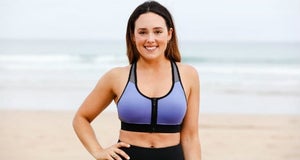
By Myprotein Writer |
Danny Worf Spicer
Flexible dieting is a hugely popular concept used by many fitness professionals all over the world. This dieting approach tracks macronutrients of food and drinks consumed in a day with targets set for the amount of protein, fat, carbohydrates and sometimes fibre which the individual wants to hit. This in turn allows the person to track their caloric intake which will help them to achieve their fitness goals of losing fat, gaining weight or maintaining their current physique.
This approach to dieting has gained popularity rapidly over the last few years due to fitness personalities promoting this style of eating. The old school approach to dieting is extremely difficult for some people to follow due to the amount of determination needed to eat “clean” foods all of the time, not allowing for any treats to keep you sane. Consuming chicken, broccoli and brown rice for every meal throughout the week soon becomes boring, resulting in people not being able to stick to their diet.
With flexible dieting there is no specific foods you have to avoid or never eat, there is essentially no rules other than making sure you hit your macronutrient targets for the day. So next time you are staring at your favourite treat thinking “Can I eat this?” Of course you can… as long as it fits your macros.
Flexible dieting does have its disadvantages though!Abusing the Freedom
I know what some of you may be thinking “What! Flexibility is the biggest advantage!” But in reality, people abuse the freedom and flexibility that this method of dieting gives us. This is why flexible dieting has been frowned upon by many fitness professionals in the industry.
There are people on social media who display 6% body fat eating donuts and wonder how they can lose weight whilst cons u ming these treat foods. This promotes flexible dieting as a diet in which people can eat whatever they want and this is not the case – nor is it healthy to do so.
Just because you CAN fit 5 slices of pizza into your daily macronutrient targets, it does not mean that this is a good idea. In order to fit these treat foods into their diets people have been depriving their body the essential foods that it needs to function at an optimal level.
Everyone Is Different
Whilst the flexibility of being able to fit in a huge variety of foods into your diet can sound appealing to some, it can be a nightmare for others.
A lot of people thrive on a strict programmed diet which explicitly outlines which foods can be eaten, how much of them to eat and when to consume them.
? Having so much flexibility can cause some people to go off the rails with their diet and stress over what they need to eat to hit their macronutrient goals for the day.
Eating Out?

Flexible dieting can allow dieters to go out to eat more as long as the restaurant has accurate macronutrient information on their website.
However, when the restaurant does not display this information, it becomes impossible for a flexible dieter to know what they are exactly consuming. And even if the restaurant does display their nutritional information, it does not mean that it is exact or accurate.
When cooking in the pressure of a kitchen, the chef’s main concern is making sure the food is safe and tastes good, the chef is not concerned about your diet plan and therefore will not be weighing out exact measurements of ingredients.
Time-Consuming
Counting your calories is time consuming enough but counting your protein, carb and fat intake takes even longer. When you are hungry and need to fulfil your cravings, you do not have time to make calculations and work out what you can fit into your macronutrient targets for the day.
Counting your macros (macronutrients) can make the cooking process twice as long as it needs to be, this is down to the fact that you have to precisely weigh every ingredient that you are using.
? There are apps which can reduce this time and make counting your macros more efficient but it can still be very time consuming.
Is It Healthy?
Counting your macros and losing fat is great, but it doesn’t mean that your body is healthy in doing so.
When you are fitting foods like pizza, chocolate and chips into your diet you leave little room for nutrient dense foods such as sweet potato, bananas and nuts. This means that whilst your body is getting the right amount of macronutrients to achieve your fitness goals, it will not be getting enough micronutrients which make your body healthy.
? Vitamins and minerals are consumed through food consumption and if you cannot fit these micronutrient dense foods into our diet then your body may lack on functioning to the best of it's ability - specifically for those tho participate in physical exercise, therefore demanding the body to work harder.
Difficult To Work Out
Flexible dieting requires you to work out a lot of different equations in order to make sure it is effective for you and to make sure you meet your fitness goals.
Firstly you need to work out your BMR (Basal Metabolic Rate) and your TDEE (Total Daily Energy Expenditure) in order to know how much food you need to consume. For a cutting diet I recommend that you subtract 200-500 calories from your TDEE, however when bulking you should add 200-500 calories on to your TDEE.
? Once you have your caloric goal you will also need to separate this into the three different macronutrient groups. As you can see there is a lot of organisation needed to be a flexible dieter.
Take Home Message
Overall flexible dieting is an excellent way of losing or gaining weight for the majority of people; however it is not for everyone and it does have its negatives.
As long as you do not abuse the freedom flexible dieting gives you, it will be a fantastic way of achieving your fitness goals and keeping your body healthy.
Whey ProteinLean muscle
Foam RollerFlexibility
MaltodextrinEnergy
BCAA'sMuscle recovery
Our articles should be used for informational and educational purposes only and are not intended to be taken as medical advice. If you're concerned, consult a health professional before taking dietary supplements or introducing any major changes to your diet.








